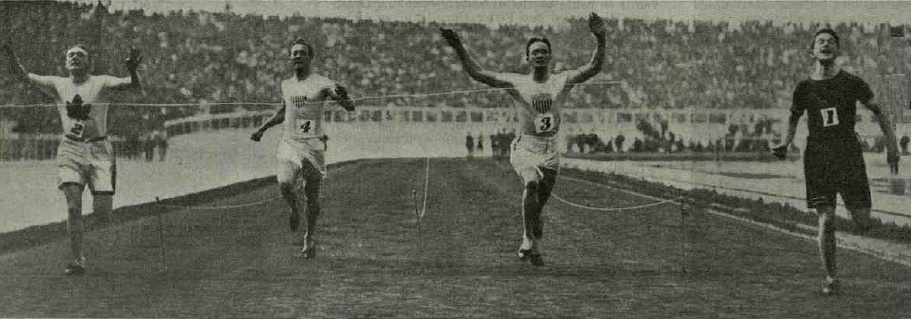1. Overview
Reginald Edgar Walker (16 March 1889 - 5 November 1951) was a prominent South African athlete who achieved international recognition as the 1908 Olympic champion in the 100 metres. Born in Durban, Colony of Natal, Walker overcame significant financial hurdles to compete in the London Games, where he became the youngest Olympic 100m champion and secured South Africa's first Olympic gold medal. His career also included service during World War I and a later life working as a clerk before returning to his home country.

2. Early Life and Background
Reginald Edgar Walker was born in 1889 in Durban, a major city in the Colony of Natal, which was then a British colony and later became part of the Union of South Africa. His early life in Durban provided the foundation for his athletic pursuits.
2.1. Birth and Childhood
Reginald Edgar Walker was born on March 16, 1889, in Durban. Details of his specific family background and early environment are not extensively documented, but his upbringing in the Colony of Natal set the stage for his emergence as a talented athlete.
3. Athletics Career
Walker's athletic career was marked by his early success in South Africa, which culminated in his historic victory at the 1908 London Olympics.
3.1. South African Championships
Prior to his Olympic triumph, Walker established himself as a leading athlete in his home country. In 1907, he became the South African Champion, a significant achievement that demonstrated his potential and qualified him for international competition. This national title served as a crucial stepping stone, paving his way to represent South Africa at the upcoming Olympic Games.
3.2. 1908 London Olympics
The 1908 Summer Olympics in London represented the pinnacle of Reginald Walker's athletic career, where he achieved an unexpected and historic victory in the 100-meter race.
3.2.1. Journey and Preparation
Despite being the 1907 South African Champion, Walker was not considered a strong favorite for the 100 meters at the 1908 London Olympics. His participation faced significant challenges, primarily due to a lack of necessary finances for travel to London. A local sportswriter in Natal initiated a fundraising effort, successfully collecting the funds required to support Walker's journey. Upon arriving in England, he received coaching from Sam Mussabini, a renowned athletics coach who would later also train Harold Abrahams. Mussabini's guidance played a crucial role in preparing Walker for the Olympic competition.
3.2.2. Olympic Races
Walker's progression through the 100-meter event at the 1908 London Olympics showcased his determination and skill. In the first round, he secured a relatively easy victory, completing the race in 11.0 seconds. He then advanced to the second round, where he competed against William W. May of the United States and other athletes. Walker narrowly edged out May, finishing the race in 10.8 seconds, a time that also equaled the existing Olympic record. This performance secured his place in the final.
The final race pitted Walker against three North American competitors, including James Rector of the United States, who had also matched the Olympic record of 10.8 seconds in both of his qualifying rounds. The final was anticipated to be a close contest between Walker and Rector. Walker started the race quickly, establishing an early lead. However, as the race progressed past the halfway mark, Rector began to catch up and briefly drew level with Walker. Demonstrating immense effort, Walker pushed himself to the maximum, staying alongside Rector. In a dramatic finish, Walker ultimately crossed the finish line approximately one and a half feet ahead of Rector, once again equaling the Olympic record with a time of 10.8 seconds.
3.2.3. Victory and Records
Reginald Walker's victory in the 100-meter final was a landmark achievement. By winning the race in 10.8 seconds, he not only secured the gold medal but also tied the Olympic record for the event. At the age of 19 years and 128 days, Walker became the youngest winner of the Olympic 100 meters, a record he held for many years. Furthermore, his gold medal marked a historic moment for South Africa, as it was the country's first-ever Olympic gold medal, solidifying his place as a pioneer in South African athletics.
4. Military Service
During World War I, Reginald Walker served in the military, contributing to the war effort in various capacities. He initially served with the 7th Infantry during the campaign in German South West Africa. Following this, in 1917, he joined the South African Overseas Expeditionary Force and was deployed to the Western Front in France. While serving in France, Walker sustained a serious injury, receiving a gunshot wound to the head. He was honorably discharged from the Army in 1919, marking the end of his military career.
5. Later Life
After his military service concluded in 1919, Reginald Walker transitioned into civilian life. He took on a role as a clerk for Ropes & Mattings, a company based in Nairobi, which was then part of the Kenya Colony. He resided and worked in Nairobi for a period before eventually returning to South Africa, his home country.
6. Legacy
Reginald Edgar Walker's legacy is primarily defined by his groundbreaking achievement at the 1908 Summer Olympics. His victory in the 100-meter race not only secured him an Olympic gold medal but also established him as the youngest Olympic 100m champion, a distinction he held for a significant period. More broadly, his triumph marked a pivotal moment for South Africa as he became the first South African to win an Olympic gold medal, inspiring future generations of athletes. His journey, from overcoming financial obstacles to achieving international athletic glory, cemented his status as a pioneer in South African athletics.